38 Nights | ATLANTIC & THE AMAZON
You will visit the following 20 places:

Manaus
Manaus is a city in Brazil, the capital of the state of Amazonas. It is situated at the confluence of the Negro and Amazon rivers. It is the most populous city of Amazonas, according to the statistics of Brazilian Institute of Geography and Statistics, and is a popular ecotourist destination. Manaus belongs to mesoregion Center Amazonense and microregion Manaus. It is located in northern Brazil, 3,940 kilometers (2,168 miles) from the federal capital, Brasília. The city was founded in 1669 as the Fort of São José do Rio Negro. It was elevated to a town in 1832 with the name of "Manaus", which means "mother of the gods" in tribute to the indigenous nation of Manaós, and legally transformed into a city on October 24 of 1848 with the name of Cidade da Barra do Rio Negro, Portuguese for "The City of the Margins of Black River". Only on September 4 of 1856 did it revert to its current name. $$https://www.youtube.com/watch?v=0KtBFHV4J6s$$
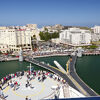
San Juan
San Juan, officially Municipio de la Ciudad Capital San Juan Bautista (Municipality of the Capital City, Saint John the Baptist), is the capital and most populous municipality in Puerto Rico, an unincorporated territory of the United States. As of the 2000 census, it has a population of 658,304 making it the 42nd-largest city under the jurisdiction of the United States. San Juan was founded by Spanish colonists in 1521, who called it Ciudad de Puerto Rico ("Rich Port City"). Puerto Rico's capital is the second oldest European-established city in the Americas, after Santo Domingo, in the Dominican Republic. Several historical buildings are located in San Juan; among the most notable are the city's former defensive forts, Fort San Felipe del Morro and Fort San Cristóbal, and La Fortaleza, the oldest executive mansion in continuous use in the Americas.
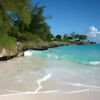
Bridgetown
Bridgetown is the capital and largest city of the nation of Barbados. It is the only city on Barbados and well over half the island's residents live there. It is the port of call for many cruise ships and is known for its duty-free shopping as much as for its more cultural and historical attractions.
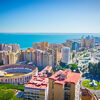
Málaga
Málaga is a large city in the southern Spanish region of Andalucia and capital of the Malaga Province. The largest city on the Costa del Sol, Malaga has a typical Mediterranean climate and is also known as the birthplace of famous Spanish artist Pablo Picasso. The city offers beaches, hiking, architectural sites, art museums, excellent shopping and cuisine. While more laid back than Madrid or Barcelona, Malaga is still the center and transport hub for the hugely popular Costa del Sol region, which is flooded with tourists in the summer, and the city has certainly cashed in on the sun and sand, with lots of new construction as well as hotels and facilities geared to tourists. However, Malaga also offers some genuinely interesting historical and cultural attractions in its old city and its setting on the coast is still beautiful.

Funchal
Funchal is the largest city, the municipal seat and the capital of Portugal's Autonomous Region of Madeira. The city has a population of 111,892, making it the 6th largest city in Portugal, and has been the capital of Madeira for more than five centuries. Because of its high cultural and historical value, Funchal is one of Portugal's main tourist attractions. It is also popular as a destination for New Year's Eve, and it is the leading Portuguese port on cruise liner dockings.
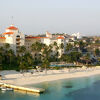
Nassau
Nassau - an attractive harbour, a colourful blend of old world and colonial architecture, and a busy port, is the capital and largest city of The Bahamas. The tropical climate and natural beauty of the Bahamas have made the city a popular tourist destination. Nassau is considered a historical stronghold of pirates.

Fortaleza
Fortaleza is the state capital of Ceará, located in Northeastern Brazil. With a population of over 2.5 million (metropolitan region over 3.4 million), Fortaleza is the 5th largest city in Brazil. It has an area of 313 square kilometres (121 sq mi) and one of the highest demographic densities in the country. To the north of the city lies the Atlantic Ocean; to the south are the cities of Pacatuba, Eusébio, Maracanaú and Itaitinga; to the east is the county of Aquiraz and the Atlantic Ocean; and to the west is the city of Caucaia. Residents of the city are known as Fortalezenses. The current mayor is Luizianne Lins a former academic at the local Federal University of Ceará and well known feminist.
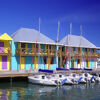
St John's
The skyline of St. John's, the capital city and cruise ship port of Antigua and Barbuda, is dominated by the magnificently evocative white baroque towers of St. John's Cathedral. The towers are the first sight of Antigua for about half of the island's visitors each year, many of whom arrive by boat. The city is famous for its various shopping malls as well as boutiques throughout the city, selling designer jewellery and haute-couture clothing. There are also many independent, locally run establishments, selling a variety of fashions.

Barcelona
Barcelona – Spain's enchanting capital, second largest and most populous city. It is a huge city that vibrates with life, and there’s certainly not another city in the country to touch it for its sheer style, looks or energy. It is one of the world's leading tourist, economic, trade fair and cultural centers, and its influence in commerce, education, entertainment, media, fashion, science, and the arts all contribute to its status as one of the world's major global cities. Barcelona is home to masterpieces of many great architects – the most famous of which is Antoni Gaudí.

Recife
Recife, the capital of Pernambuco, is one of the largest and most important cities on the northeastern coast of Brazil. Known for its large scale production of sugar cane, its name is an allusion to the stone reefs that are present by the city's shores. The many rivers, small islands and over 50 bridges found in Recife city centre characterise its geography and led to the city being called the "Brazilian Venice." Recife stands out as a major tourist attraction of the Northeast, both for its beaches and for its historic sites, dating back to both the Portuguese and the Dutch colonization of the region. The beach of Porto de Galinhas, 60 kilometers (37 mi) south of the city, has been repeatedly awarded the title of best beach in Brazil and has drawn many tourists. The Historic Centre of Olinda, 7 kilometers (4.3 mi) north of the city, was declared a UNESCO World Heritage site in 1982, and both cities' Brazilian Carnival are among the world's most famous.

Rio de Janeiro
Rio de Janeiro or just simply Rio, is one of the most visited cities in the Southern Hemisphere and is known for its natural settings, Carnival, samba, bossa nova and balneario beaches such as Barra da Tijuca, Copacabana, Ipanema and Leblon. The city has a remarkable architectural heritage, some of the country’s best museums and galleries, superb restaurants and a vibrant nightlife. With so much to see and do, Rio can easily occupy a week and you may well find it difficult to drag yourself away. As Rio achieved independence from the Portuguese rulers, the city expanded politically, culturally, economically and architecturally.
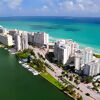
Miami
Miami is a major city located on the Atlantic coast in southeastern Florida and the county seat of Miami-Dade County, the most populous county in Florida and the eighth-most populous county in the United States with a population of 2,500,625. The 42nd largest city in the United States, with a population of 433,136, it is the principal, central, and most populous city of the South {Florida} metropolitan area, the most populous metropolis in the Southeastern United States. According to the US Census Bureau, Miami's metro area is the seventh most populous in the United States, with an estimated population of 5,547,051 in 2009.

Cadiz

Cartagena
Cartagena is a Spanish city and a majornaval station located in the Region of Murcia, by the Mediterranean coast, south-eastern Spain. The metropolitan area of Cartagena, known as Campo de Cartagena, has a population of 409,586 inhabitants. Cartagena has been inhabited for over two millennia, being founded around 227 BC by the Carthaginian Hasdrubal the Fair as Qart Hadasht, the same name as the original city of Carthage. Much of the historical weight of Cartagena in the past goes to its coveted defensive port, one of the most important in the western Mediterranean. As far back as the 16th century it was one of the most important naval ports in Spain, together with Ferrol in the North. It is still an important naval seaport, the main military haven of Spain, and is home to a large naval shipyard. The confluence of civilizations as well as its strategic harbour, together with the rise of the local mining industry is manifested by a unique artistic heritage, with a number of landmarks such as the Roman Theatre, the second largest of the Iberian Peninsulaafter the one in Mérida, an abundance of Phoenician, Roman, Byzantine and Moorish remains, and a plethora of Art Nouveaubuildings, a result of the bourgeoisie from the early 20th century. Cartagena is now established as a major cruise ship destination in the Mediterranean and an emerging cultural focus. It is the first of a number of cities that eventually have been named Cartagena, most notably Cartagena de Indias (Cartagena of the Indies) in Colombia.

Alter Do Chao

French Guiana
French Guiana is an overseas region of France on the northeast coast of South America, composed mainly of tropical rainforest. Covered in rainforests, with numerous creeks and small rivers, the ruins of 17th-century Fort Cépérou overlook the capital, Cayenne, with its colorful Creole houses and street markets. French Guiana is also a great place for beach lovers!

Santarem

Parintins

Saint George's










